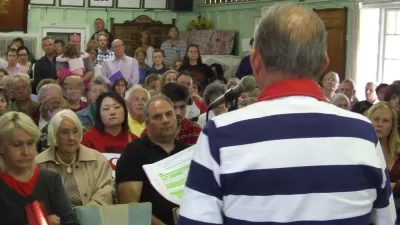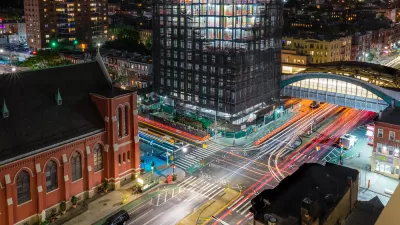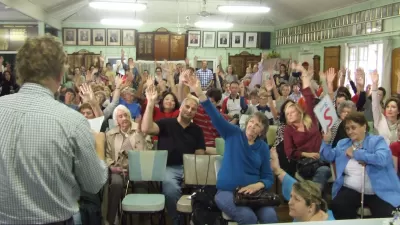Dating back to a tradition begun in the 1630s, public meetings are an essential part of the political systems, and planning processes, of U.S. cities. Public meetings are also broken, according to this article.

Patrick Sisson writes on the subject of public meetings—surely a favorite subject of planners all over the Unite States. Public meetings are broken, pronounces the headline of the article, and there are plenty of anecdotes to back up the claim.
Sisson starts with a short history of public meetings, before sharing numerous studies that present evidence of the unrepresentative reality of public meetings, despite the democratic intentions of such gatherings, and describes the roots of the problems plaguing public meetings around the country.
Sisson also includes recommendations for solving the root problems with public meetings, citing the expertise and experience of professionals from the Greater Good Studio. Another big question examined in the article is whether public meetings, and by extension local control, is a useful tool for planning and democracy at all.
Looking for more anecdotes on the state of public meetings in U.S. cities, Sisson is also requesting contributions at #worstpublicmeeting on Twitter. Responses can also be found in the replies on the tweet below.
Neighborhood meetings, a cornerstone of local democracy & planning, can be biased, unrepresentative & devolve into screaming matches. I spoke w/experts to hear why they're broke & how to fix them. Tell me your meeting horror stories #worstpublicmeeting https://t.co/GXZppK2CsY
— Patrick Sisson (@patrickcsisson) February 12, 2020
FULL STORY: Public meetings are broken. Here’s how to fix them.

Study: Maui’s Plan to Convert Vacation Rentals to Long-Term Housing Could Cause Nearly $1 Billion Economic Loss
The plan would reduce visitor accommodation by 25,% resulting in 1,900 jobs lost.

North Texas Transit Leaders Tout Benefits of TOD for Growing Region
At a summit focused on transit-oriented development, policymakers discussed how North Texas’ expanded light rail system can serve as a tool for economic growth.

Why Should We Subsidize Public Transportation?
Many public transit agencies face financial stress due to rising costs, declining fare revenue, and declining subsidies. Transit advocates must provide a strong business case for increasing public transit funding.

How to Make US Trains Faster
Changes to boarding platforms and a switch to electric trains could improve U.S. passenger rail service without the added cost of high-speed rail.

Columbia’s Revitalized ‘Loop’ Is a Hub for Local Entrepreneurs
A focus on small businesses is helping a commercial corridor in Columbia, Missouri thrive.

Invasive Insect Threatens Minnesota’s Ash Forests
The Emerald Ash Borer is a rapidly spreading invasive pest threatening Minnesota’s ash trees, and homeowners are encouraged to plant diverse replacement species, avoid moving ash firewood, and monitor for signs of infestation.
Urban Design for Planners 1: Software Tools
This six-course series explores essential urban design concepts using open source software and equips planners with the tools they need to participate fully in the urban design process.
Planning for Universal Design
Learn the tools for implementing Universal Design in planning regulations.
Ascent Environmental
Borough of Carlisle
Institute for Housing and Urban Development Studies (IHS)
City of Grandview
Harvard GSD Executive Education
Toledo-Lucas County Plan Commissions
Salt Lake City
NYU Wagner Graduate School of Public Service





























